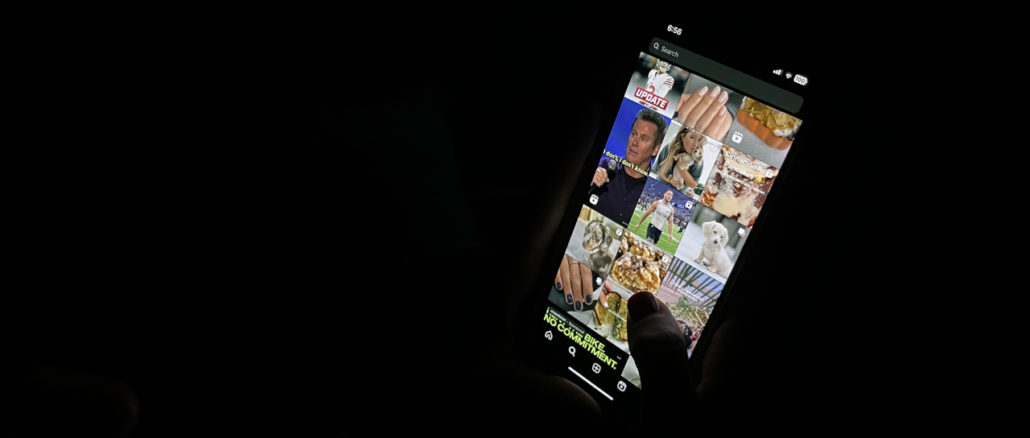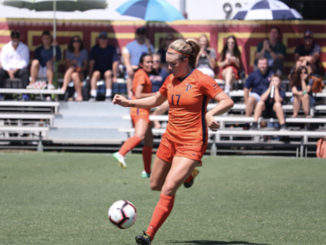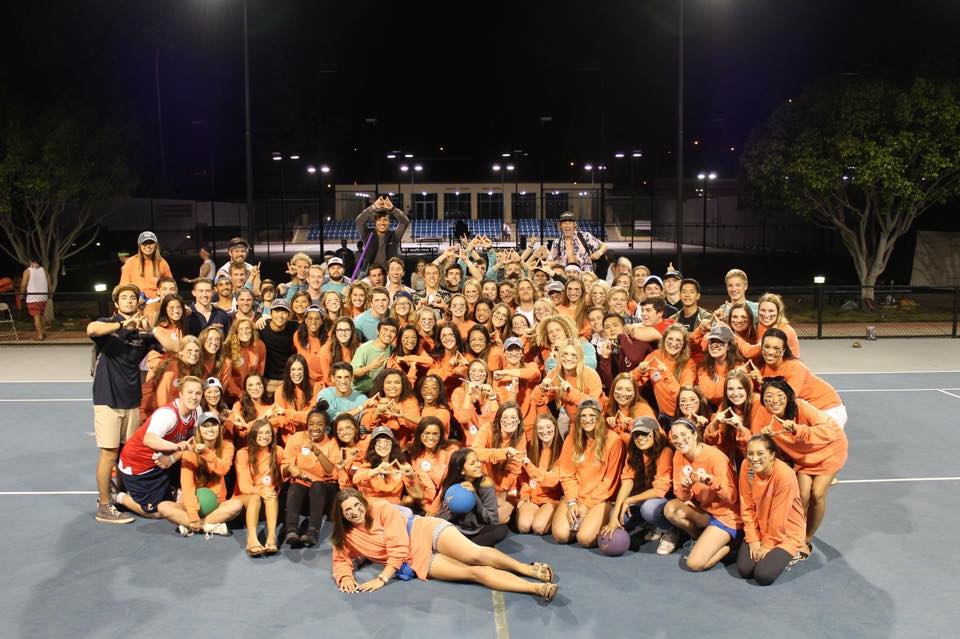
As screen time goes up, sleep time goes down.
A Pepp Post poll of 51 students found that 98% of students use their phones within an hour of going to sleep, and 52% of students have difficulty falling asleep. Blue light is emitted from phone screens, leading to the disruption of the natural circadian rhythm and melatonin production meant for human beings, said Danté Spencer, licensed therapist and Pacifica Graduate Institute PhD candidate. This makes it harder to fall asleep.
“It’s eye-opening because I think it adds up,” said Londyn Johnson, a junior integrated marketing communication and political science double major. “How many years do we spend on our phones […] it’s kind of scary actually.”
Some Pepperdine students struggle to reduce screen time while away from home because they use their phones to connect with friends and family.
Varying types of screen usage create different levels of brain activity, therefore not all screen time is created equal.
Blue light affects circadian rhythm
Before the invention of clocks, humans rose with the sun, and went to sleep with the darkness, Spencer said. Now technology emits blue light that interrupts the body’s melatonin production and keeps the brain active and awake.
Although the poll showed 90% of students are aware of the harmful effects of blue light, 67% do not actively try to avoid it before bedtime.
“I usually get tired around 11 or 12,” said Michael Sugimoto, junior political science major. “But if I stay up longer and I’m on my phone, I think it stimulates my brain to be more awake so then I can’t fall asleep for another hour or so even after I put my phone down.”
Apple products have updated features such as “night shift” to emit warmer light from the iPhone or Macbook to reduce sleep disturbance slightly.
Beyond blue light, how one uses one’s phone late at night also matters, Spencer said. What may seem like mindless scrolling on social media is actually leading to active thoughts such as judgment and comparison. Scrolling on a phone at night time activates the brain more than passively watching a television show. Therefore, not all screen time is equally damaging.
“Then we lay down and put the phone away, and then our minds are still processing those thoughts, versus kind of just passively watching some reality show or something that’s not going to affect the brain or keep us up as much as say social media,” Spencer said.
Researchers linked passively watching TV in the hour before bedtime to longer sleep duration, about 20 minutes more on average each night in the study, LM Huberts, AL Opperhuizen and LJM Schlangen wrote in an October 2022 Lighting Research and Technology article.
However, researchers found that using a computer or smartphone within the hour before bedtime led participants to go to bed later and have a shorter night’s sleep. Researchers said smartphone use had the most significant impact, which was linked to an average of 35 minutes less sleep per night.
The era of scrolling
The poll showed 86% of students scroll on social media before bed.
Fear of missing out or “FOMO” is a key reason for decline in sleep and subsequently a decline in academic success, Larry D. Rosen wrote in an October 2017 The Phi Delta Kappan article. Students often use smartphones until the moment they attempt to fall asleep.
“I think social media, like Instagram and TikTok are primarily what I’m on a lot, and then Snapchat, whether it’s looking at people’s stories or texting people,” Sugimoto said.
Johnson thinks that her Instagram has her “down to a science” and that the platform has a great understanding of exactly what she is interested in — leading her to spend increased time on the app.
Students said communication for their generation is primarily online and AI-created algorithms on social media sites keep users hooked on platforms with advancing technology.
“I deleted Tiktok for this specific reason, but yeah, Instagram and Snapchat are my go-tos before bed,” junior film major Colin Proctor said.
Students face academic consequences
Losing sleep because of too much screen time can lead to consequences for students in their academics. The poll showed students get only six to seven hours of sleep nightly.
“I’ll get wrapped into going on my phone for like three hours when I’m like, OK, I’ll go on my phone for 20 minutes and then three hours pass and I’m like, ‘What was I thinking?’” first-year IMC major Kaylee Snyder said.
The poll found that roughly 80% of students found lack of sleep to be getting in the way of their academic performance. Most students found that they struggled to focus, but some missed class.
Symptoms of sleep deprivation throughout the day can look like fatigue, irritability and clumsiness, Spencer said.
“The other day I skipped my 8 a.m. class because I simply did not wake up,” Johnson said. “It’s something I don’t want to repeat but screen time did affect that.”
The poll found that phone usage before bed has resulted in missed classes and difficulty focusing, as well as symptoms including headaches and eye fatigue.
“I say that I’m going to go to bed early so I can wake up before class to do an assignment,” Snyder said. “But then I go on my phone and I wake up later than I scheduled, leaving no time for the assignment.”
The reality of screen time and efforts to improve
With students being away from their loved ones and their high-volume school schedules, screen time is the primary way of connection.
“It’s super difficult because we live so much of our lives online, ” Johnson said. “I keep up with friends and family, especially being away at college. I’m from Texas and so there’s no real way to connect with my family other than being on my phone.”
Students said there are positives to phone usage in students’ lives on campus and learning how to balance school and social life is a process.
“I feel like it’s necessary at this point in life to be on it all the time. I’m not using it for negative reasons, I’m using it to communicate,” Proctor said. “The only negative thing would be sleep, being on it right before bed is the main thing I should cut back on.”
Sugimoto said college life is a huge balancing act. He has been using Google Calendar to plan his responsibilities and make sleep a priority, but this has been a work in progress.
Balance is a frequent topic of discussion for students as they navigate academics, social life and extracurricular activities.
Although Snyder said she does not have it down yet, she wants to work on implementing healthy screen time into her life.
“I do not want my phone to be the first thing I go on in the morning and the last thing I go on at night,” Snyder said. “I want to find times during the day where it is healthy to go on my phone.”
Marla Steel completed the reporting for this story in Jour 241 under the supervision of Dr. Christina Littlefield and Dr. Theresa de los Santos. Dr. Littlefield supervised the web version of the story.



